VIII—
History and Myth:
1930–1938
ALEKSANDR BLOK, 1901
As a Russian or a Hellene understands it, truth is directly related to every individual, whereas for a Roman and a Jew it is mediated by society.
FATHER PAVEL FLORENSKII, The Pillar and the Affirmation of Truth (1914)
And now came the sudden end of that tragedy: motivated by the entire development, the stage death turned out to be real. And we are shocked like a spectator before whose eyes, in the fifth act of a tragedy, an actor is losing real blood. The boundary between theater and life has been demolished.
BORIS EIKHENBAUM, "Blok's Fate" (1922)
Between the Wolfhound and the Wolf
Ma poi ch'i'fui al piè d'un colle giunto,
là dove terminava quella valle
che m'avea di paura il cor compunto,
guardai in alto, e vide le sue spalle
vestite già de' raggi del pianeta
che mena dritto altrui per ogni calle.
DANTE, Inferno, canto 1
Not the production error, or the failure to contact the original translator, or the subsequent insinuations, lawsuits, and counter law suits, not even the arbitration by the Federation of Soviet Writers could have
added up to the nightmare that the Gornfel'd affair ultimately became for Mandelstam had it not coincided with the outset of the Stalin revolution. The pressures caused by this "great break," as the late 1920s came to be known, were crushing and omnipresent. The entire society was on the move, and in the frenzy of the mass dislocations, construction, and terror of the First Five-Year Plan, every event of note resonated to the beat of the political struggles. Little wonder, then, that literary controversies—involved since 1917 invariably with power—grew so uncompromising and sharp that a local incident, as Mandelstam's certainly was, erupted into a serious scandal with grave political implications. The "affair" became one more test of political agility for the warring factions of the literary establishment, whose own power ebbed and flowed with the changes in the political fortunes of their patrons and allies at the top.
Mandelstam was not above the fray. When I. I. Ionov, the publisher who replaced Mandelstam's friend Narbut as a manager of the translation industry, vowed to deny Mandelstam any future contracts (ostensibly because he had violated one contract by translating Meyne Reed from the French rather than the original English),[1] Mandelstam did not accept his fate meekly. For him, as for many authors who could earn a living by their own writing, translation work represented an equivalent to employment in the proverbial "satanic mills": a backbreaking, alienating labor with pay barely sufficient to sustain life. The strategy he chose was to declare war on the entire translation establishment. The opening salvo was a lengthy article entitled "Streams of Slapdash," for which Mandelstam borrowed heavily from the arsenal of contemporary cannibalistic rhetoric. Fired in the middle of the government campaign to purge the Soviet apparatus of undesirable elements, it fit neatly on the third page of the April 7, 1929, issue of Izvestiia. Consider this passage:
Poisoning of wells, wreckage and pollution of sewers and water mains, poor maintenance of caldrons in communal kitchens are all crimes liable to prosecution by the courts. But the ugly, unbelievable to the point of indignation, state of the shops in which world literature is produced for our reader, the wreckage of the transmission belts that connect the mind of the mass Soviet reader with the aesthetic production of the West and the East, of Europe and America, indeed of the whole of mankind in its past and its present—all this unheard-of wreckage has thus far gone unpunished, has been treated as something innocent, as a matter of course.[2]
Judged on merit, Mandelstam's outrage should seem fully justified. But in the wake of the Shakhty trial (one of the first exemplary
prosecutions of "bourgeois specialists"), to describe the literary hacks as "wreckers" (or "pests," vrediteli ) and to demand criminal prosecution for those whose only crime was an atrocious translation job amounted to more than an indulgence in a rhetorical pastiche. Understandably, the party under attack was quick to respond to Mandelstam's accusations, if not with heavy guns, then at least with field artillery of poisonous innuendo, suggesting that it was not the business of authors caught plagiarizing to promulgate publishing reforms.[3] The eventual result (see Appendix I for details) was Mandelstam's effective alienation from the literary community. Another author might not have survived, as author, the hardships of being an outsider, but Mandelstam, whose reputation had recently been buttressed by the simultaneous publication of three collections (one of poetry, one of essays, and one of prose—all in 1928) managed to make do, thanks in part to the patronage of the still powerful Nikolai Bukharin.[4]
More important, the "affair," its scale magnified by the rapid politicization of the entire society, led Mandelstam to assume once again, as in the years of Stone, the proud and heroic stance of a literary Hippolytus. "'The sick son of the century,' " wrote Nadezhda Mandelstam, paraphrasing one of the poet's mythologies and suggesting an almost miraculous cure-conversion, "suddenly realized that it was he who was, in fact, quite healthy."[5] Indeed, some of Mandelstam's poems of the early 1930s indicate that he was abandoning, albeit gradually, the irony and self-parody of Parnok and his creator[6] in favor of his earlier master plots.
One of the more programmatic encounters with the restored poet occurs in "Lamarck." Although it may seem abstract now, this 1932 poem bears the unmistakable marks of its time, associated as it was with perhaps the most important symbolic project of the early 1930s—the "heroic" construction of the Moscow Metro. The prominent "moving ladder," a reference to the subway escalator, binds the poem unequivocally to the industrialization under the First Five-Year Plan. Obviously Mandelstam, who had proposed to steer the Egyptian funeral barque of the old culture into the future, thought it significant that his compatriots were now measuring the progress of the new state by the speed with which the mining crews burrowed deep into the earth. After all, they were moving back in time—in the archaeological, biological, and geological sense—in order to construct the first Russian and socialist underground. This is why I propose to interpret "Lamarck" as a meditation on the place of Mandelstam's poet in the heroic labors of the First Five-Year Plan.
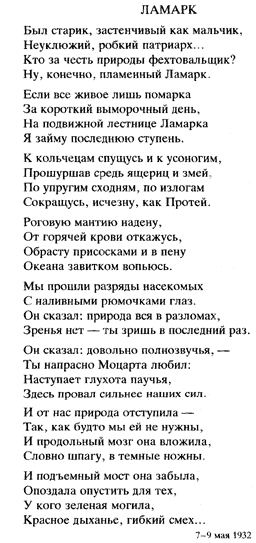
Lamarck
There was an old man, shy like a boy,
An awkward, timid patriarch . . .
Who is the swordsman fighting for the honor of nature?
But, of course, the fiery Lamarck.
If all that's alive is but a slip
Made in a short heir-less day,
On the moving stair of Lamarck
I shall take the very last rung.
I'll descend to the annelids and the arthropods,
Rustling by the lizards and the snakes,
Down the hanging bridges, into the breaches
I will shrink, disappear like Proteus.
I shall put on a corneous mantle,
My hot blood I shall give up,
Grow suckers all over and into the froth
Of the ocean shall bore like a curl.
We have passed the category of insects
With filled shot-glasses for eyes.
He said: "Breaks are everywhere in nature,
The sight is no more—you've seen your last."
He said: "Enough of sonority,
You have loved Mozart in vain,
Now begins the spiders' deafness,
Here comes a breach beyond our strength."
And nature stepped back away from us
As if she needed us no more,
And she slid the oblong brain,
Like a sword, into a dark sheath.
And she forgot the drawbridge,
Was too late to lower it for those
Whose grave is green,
Whose breath is red, and laughter limber . . .[7]
Descending the mineshaft of time, the poet is guided by the scientist, who in his patriarchal appearance bears some resemblance to the author himself. The journey itself is mapped according to the Lamarckian evolutionary scheme, which in turn is traced over the subterranean cosmology of Dante. Particularly noteworthy, Mandelstam superimposed the two schemes onto a third: the social, ethical, and kenotic tradition of the Russian intelligentsia, the history of its identification with the people's cause. Hence the tour becomes also a movement down the ladder of social class, evoking the intelligentsia's past commitment to the liberation of the humblest, those who, like the lower forms of life, were deprived of the pure pleasures of music, visual art, and thinking. The poem's wordplay makes the journey even more specific. The humble Dostoevskian offspring of the Decembrist nobility, the clumsy "mosquito prince" and the self-effacing Egyptian postage stamp, MARKa, although they remain outside the poem proper, never-
theless serve as genealogical antecedents, as the "inner form" of the shy and awkward La MARK . They invest the name with an elaborate cumulative meaning, including the convention of tracing the origins of the intelligentsia in the nobility's revolt of 1825 that motivates the particular presentation of the Swiss naturalist. A scientist, an intelligent in the Russian sense, he is a noble "swordsman fighting for the honor of nature" down to its lowest forms.[8] The alternative route, discarded by the poet, would have meant supporting the "mutation" theory of history, in which the present forms owe no loyalty to past memories and commitments, dismissing them as poMARKi of the past—slips, mutations, mistakes of youth.
This use of science for a discourse on the ethics of history begs a comparison with Albert Einstein's refusal to believe that God could play dice with the universe. But perhaps more apposite is Dostoevsky's famous wager on Christ. Like him, Mandelstam declares in "Lamarck" a permanent loyalty to a world based on a form of imitatio Christi, the kenotic tradition of the intelligentsia, even if the idea of such a world has been refuted as false or, closer to the sense of the poem, irrelevant.
Like many poems of Tristia, "Lamarck" was also about a descent into the underworld, but unlike them it involved neither an Oedipus wracked by guilt nor a member of a prematurely dead generation meekly assisting in his own interment. A Dantean pilgrimage, this descent was undertaken by a hero of the old intelligentsia faith, unwavering in his principles. Even after he had found himself separated from the present by the unbridgeable breach of a historical death, he was still alive: his gravesite was covered with verdure, he could still laugh like a youth, and his breathing, or spirit, was as red as ever—in harmony with his past commitment and the present times.
Mandelstam's intelligentsia contemporaries, who had lived through the "great break" (or was it a breach?) and witnessed the collectivization of agriculture, the debates in the biological sciences, as well as the construction of the Moscow subway, which then was the symbol par excellence of progress and urban modernity, could no doubt see in the poem a meditation on Russia's recent history. Like them, Mandelstam was groping for a solution to the riddle of the revolution, trying to find a formulation for two contradictory theses: (1) that the revolution was justified historically and ethically and therefore had to be accepted; and (2) that it was hard or impossible to countenance morally its cruelty and indifference toward individual human beings, especially members of the outmoded intelligentsia. And although the breach in ideology caused by this contradiction could not be transcended by Mandelstam intellectually, the poet Mandelstam succeeded in making
it appear natural by merging it with the analogous phenomena in two authoritative texts: a scientific theory and the foremost masterpiece of Christian art. This was Mandelstam's contribution to the theory of evolution, and as in the biological debates of those days when neoLamarckism was gaining official sanction,[9] the picture that emerged out of Mandelstam's otherwise loyal poem was paradoxical and complex.
It would thus be wrong to reduce Mandelstam's writings to a romantic notion of a David fighting the Goliath of the Soviet state. Mandelstam's commitment to the "revolution," however naive and utopian his expectations may appear to us now, was long-standing and entirely serious. It is worth recalling that he sided with the Reds in the civil war; relegated those who followed the Wrangel army into exile to the Antechamber of the Inferno, where the souls of the undistinguished, or "neutral," fall like leaves from the Tree of Life;[10] praised Lenin as "the people's leader assuming in tears the fateful burden" of state power;[11] and finally ridiculed his own humanistic affinities in The Egyptian Stamp.[12] He lived in an ambiguous epoch, and his attitudes were shaped by it accordingly. Even in The Fourth Prose (1930) we see Mandelstam appealing to some sort of revolutionary puritanism and asceticism. Visited by a lame girl, a member of the "light cavalry" on an ideological search-and-destroy mission, the narrator Mandelstam, who was on the staff of this "cavalry's" newspaper, Moskovskii komsomolets, managed to recognize the devil's hoof[13] and began to behave accordingly in order to guard himself against this pathetic emissary of Beelzebub (italics are mine):
We mooch cigarettes from one another and continue our Chinese games, encoding into the formulas of animal cowardice the great, powerful, forbidden concept of class. Animal fear is banging on typewriters, animal fear is doing copy editing on sheets of toilet paper, it rattles off denunciations, hits those who are lying down, demands execution for prisoners.[14]
A man who had given up on his former commitment to the revolution would hardly have appealed to the "great, powerful, forbidden concept of class," even if he despised, as did Mandelstam, the atmosphere of animal fear engendered by the "accelerated socialist construction." Nor would he have mocked the "trembling innocent bourgeois" and the party members reposing in their comfortable company.
I have always wondered where the bourgeois get their fastidiousness, their so-called decency. Decency is what establishes kinship between the bourgeois and the animal. Many party members rest in the com-
pany of the bourgeois for exactly the same reason that the adults require the company of pink-cheeked children.[15]
Even taking into account Mandelstam's distraught state following the episode with Gornfel'd (he consulted a psychiatrist in 1930)[16] and the contradictory (polyphonic?) nature of the text itself, The Fourth Prose represented a savage satire—an "idealistic" indictment of Soviet society and the state reminiscent of Maiakovskii's "committed" attacks on the homo soveticus in both poetry and drama. The decision to conclude The Fourth Prose with a transparent allusion to the 1918 Mystery Bouffe (an emblem of the revolution's enthusiastic infancy) can be interpreted as a nostalgic invocation of the monastic simplicity and "incorruptibility" of the years of War Communism, which contrasted sharply with the growing terror interlarded, as it were, with the "bourgeois vestiges" of NEP. "Who needs this soiled and pawed socialism anyway?" Mandelstam reportedly wrote in one of the destroyed drafts of The Fourth Prose.[17] Maiakovskii and Mandelstam were not alone in looking back to the puritanical aura of War Communism, so different, it seemed, from the perceived putrefaction of Soviet society and state at the close of the NEP and the beginning of the Stalin epoch. Such sentiments were not uncommon in the intelligentsia milieu, and it is a sad historical irony that it happened to be Stalin and his allies who used these sentiments and the civil war rhetoric that went with them as the foundation of a society very different from what the two poets could have had in mind.[18] All of this is to suggest that the "parting of the ways" between the state and the members of the intelligentsia elite took a few years to develop.
Indeed, many of Mandelstam's poems of 1931–32 display an ambiguous attitude to the Stalin revolution. Although much of what he saw he found repulsive, he was nevertheless unwilling to declare himself squarely against the changes then taking place. In poem after poem he projected the image of a man torn between his commitment to the cause of the "fourth estate"—which he identified with the continuing revolution—and his growing amazement, and later, horror, at its violent and distorted form:

Guard me! No begging, no complaints! Hush!
No whimpering!
Did the raznochintsy
Tramp in their cracked boots for me now to betray them?
We shall die like foot soldiers,
But shall praise neither theft, nor toil, nor lies![19]
This poem, "Midnight in Moscow," which contained a sharp retort to Pasternak, was published in Literaturnaia gazeta in November 1933. At that time, when newspapers were full of loyal affirmations of social transformation, the poem could not be interpreted as a sign of dissent, despite the complexity and ambiguity of much of its imagery. After all, it began with midnight and ended on the optimistic note of the 1930s, as Moscow's "Buddhist," ahistorical slumber came to an end in the new Petrine Westernization (hence the Renaissance paintings), carried out by the latter-day Peter the Great, Joseph Stalin:
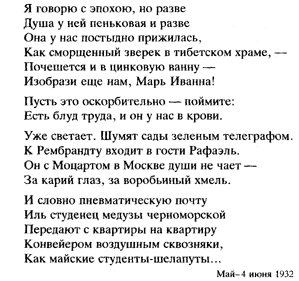
I speak with the epoch, but is
Its soul cheap and has
It been a shameful hanger-on among us,
Like the shriveled little creature in a Tibetan temple—
It'll scratch itself and hop into a zinc bath—
More tricks for us, please, Mar' Ivanna!
Even if it's offensive, you ought to understand:
There is lust for labor, and it's in our blood.
It is already sunrise. The parks' green telegraph is humming.
Rembrandt has just arrived to visit Raphael.
Neither he nor Mozart can get enough of Moscow—
Charmed by her brown eye, her sparrow drunkenness.
And like the pneumatic mail
Or the aspic of the Black Sea medusa,
From flat to flat,
Drafts, like a conveyer belt, pass on,
Like wayward students gone a-maying . . .[20]
The May 1932 issue of Novyi mir contained a poem by Pasternak that expressed similar sentiments with the aid of a similar Petrine metaphor—if more bluntly (I cite only part of it):
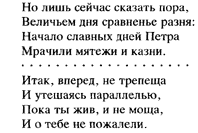
But only now the time has come to say,
Marking the difference by stressing today's grandeur:
The beginning of Peter's glorious days
Passed under the pall of revolts and executions.
. . . . . . . . . . . . . . . . . . . . . . . . . . . . . . . . . . . . . . . . . . . . . . .
Hence forward, without trembling,
And drawing on the parallel for solace,
While you are still alive and not a relic
For whom one should feel sorry.[21]
The ideological frame of reference that Mandelstam had absorbed in the course of his life left him and many of his contemporaries with a limited choice: either to accept the "march of history" or to join those whom Mandelstam presented in a 1922 poem as parasites "trembling on the threshold of the new days.[22] His inability to reject this procrustean dilemma altogether, to substitute for it another, more varied discourse, helps to explain why he found it necessary in 1931 to reaffirm his pledge (indeed a spell—Chur, "Guard me!") of allegiance to the fourth estate, to insist on his fundamental alienation from the Imperial world that had reared him, his sentimental attachments notwithstanding, and even to doubt—a rarity in Mandelstam—his own rectitude.

With the Imperial world my connection is no more than childish.
Fear of oysters, and a furtive glance at the guardsmen,
Not a speck of my soul I owe it,
As much as I tortured myself to look like another.[23]
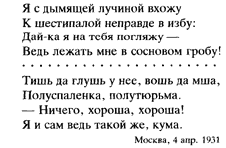
Holding a smoldering chip, I walk into
The hut of the six-fingered untruth:
Let me take a look at you—
For I shall be lying in a pine coffin!
. . . . . . . . . . . . . . . . . . . . . . . . . . . . . . . . . . . . . . . .
It's still and deep at her place, lice and moss,
It's half-bedroom, half-jail
—It's all right, you are good, you are good!
I myself am like this, my cousin.[24]
His close friend B. S. Kuzin (whose friendship "awakened" Mandelstam "like a shot, " as he put it in his poem "To the German Tongue") wrote about the poet's state of mind in the early 1930s:
In particular, it seems he had a strong temptation to acquire faith in our official ideology, to accept all the terrors for which it served as a screen, and to join the ranks of the active fighters for the great ideas and for the beautiful socialist future. . . . But whenever he would begin his loyal twitter—and I used to respond to it with tempestuous anger—he did not get hotly polemical, did not ardently insist on his position, but only begged me to agree with him: "Tell me, Boris Sergeevich, tell me, isn't this really good?" And in a day or two: "Did I really say this? What nonsense!"[25]
The famous "wolf" poem exemplifies, perhaps better than any other poem of the period, the state of mind Mandelstam wished to project in his poetry (and apparently projected in life, too) at the beginning of the 1930s. It merits closer consideration.
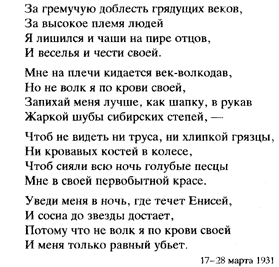
For the sake of the thundering glory of the coming ages,
For the sake of the lofty tribe of men.'
I have been deprived of the cup at the feast of my fathers,
Of merriment and honor.
The age-wolfhound jumps on my shoulders,
But I am not a wolf by blood,
Better stuff me, like a hat, into the sleeve
Of the hot fur coat of the Siberian steppes.
So as not to witness the quaking, or the slushy filth,
Or the bloody bones in the wheel,
So as the blue lynxes shone all night
In their primeval beauty,
Take me into the night where the Yenisey flows
And the pine reaches out to the star,
Because I am not a wolf by blood
And only by an equal shall I be killed.[26]
The bill of particulars the poem presents to the epoch is approximately as follows: the revolution that has sacrificed the present for bombastic future glory has deprived the poet of "the cup at the feast of
[his] fathers, of merriment and honor," has wrongfully assaulted him ("The age-wolfhound jumps on my shoulders"), and finally, has created a world so violent, filthy, and scared that the sight of it has become unbearable for the poet. His only wish now is to be led away by some unnamed master of his fortune—as far away as possible from this scene, even to Siberia. The last stanza contains an invocation of the Lermontovian "magic tokens," a star and a pine tree,[27] which are to assure poetry's eternal "prestation," a spell—like repetition in which the poet once again protests the attack by affirming that he is not "a wolf by blood." This particular formulation, I hardly need point out, had a powerful significance for a poet who had repeatedly inscribed himself in incest narratives (the Russian for "incest" is literally "polluting or mixing blood"). The poem ended in a folkloric formula of conditional invincibility—a sort of Achilles' heel.
The curious phrase by which the poet expresses his preference for Siberia (better to be a hat stuffed into the sleeve of a coat) requires pause and elaboration. It echoes Mandelstam's polemic with a recent poem by Pasternak, where poetry was compared with a ticket to a concert of "roots and wombs" and, more important, with the token (nomerok) one received in exchange for one's topcoat and hat, which according to the still new rule had to be checked before the performance. Apparently Pasternak's poem was seen by Mandelstam as part of the earlier polemic.[28]
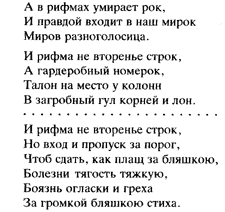
And in the rhymes, one's fate dies,
And the heteroglossia of worlds
Enters our little world as truth.
And the rhyme is not an echoing of lines,
But a cloakroom token,
A voucher for a place at the columns,
A pass into the underworld of roots and wombs.
. . . . . . . . . . . . . . . . . . . . . . . . . . . . . . . . . . . . . . . . . . .
And the rhyme is not an echoing of lines,
But an entry and a pass [admitting] beyond the threshold
Where you check in, like a raincoat in exchange for a token,
The burdensome burden of [love]sickness,
The fear of exposure and sin—
In exchange for the loud token of verse.[29]
Mandelstam interpreted this therapeutic view of verbal art as a trivialization of the poet's sacred calling to bear witness to and identify with one's age. Checking in one's coat of quotidian existence in order to gain admission to art—a sort of concert hall of life, to unpack Pasternak's metaphor—was not an acceptable narrative for the poet who fashioned himself a Joseph or, more recently, as Gogol's Akakii Akakievich. His coat could not be checked in—for it was not a thing but a token signifying a void that could never be filled.
Mandelstam's rejoinder to Pasternak's seemingly innocent variation on an ancient theme was composed in the form of snatches of conversation, as if overheard in a crowd of spectators fighting for their coats after a performance. Those who followed Pasternak's concept of poetry—"upper-class lies"—were soon to mingle with the snorting and unrefined citizenry (burghers, gorozhaue, that is, meshchane ). But those who followed Mandelstam would recall the heroism of War Communism, the exemplars of tragic loyalty (Lermontov's Masquerade ), and the historical suffering of the dispossessed who, like Nekrasov's peasants, dared not enter magnificent buildings. A poet, Mandelstam is insisting, should not forget what century he lived in—the century of the wolfhound destined to rid the world of the wolf that had preyed on people since the beginning of time. Mikhail Zoshchenko's 1927 story "Pleasantries of Culture," in which the cloakroom rule is identified with the NEP and its absence with War Communism, amply justifies such a reading.[30] Bearing the demeanor of kenotic resignation emblematic of the Russian peasant ("hat in hand"), such a poet should remain outside and share his fate with the humble, who are shoved unceremoniously, like a hat into a coat's "sleeve" by a rude cloakroom attendant. For the poet, who chose a martyr's way, prayer was the only hope.
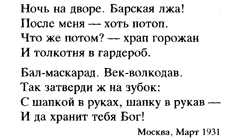
It's night outside. What upper-class lies!
Après moi le déluge.
But then what?—The snorting of citizens
And pushing and shoving in the cloakroom.
A ball-masquerade. The wolfhound-age.
You've got to remember this well:
With hat in hand, hat into the sleeve—
And may God preserve you! [31]
Although this was a poem militant in tone and animated by the poet's empathy with the humiliated and the wronged, particularly the peasants victimized by collectivization, its companion piece, "For the Sake of the Thundering Valor," displays a different and far more ambivalent set of accents. Indeed, contrary to the traditional view,[32] a closer, more contextual scrutiny reveals a picture in which the poet's aversion to the brutality of the epoch is combined with a historical and moral justification of the very cause of his distress.
As with a number of Mandelstam's poems, this one is constructed around an allusion to Dante, specifically Virgil's prophecy in canto 1 of the Inferno, which helps to identify the prototypes of the protagonists in Mandelstam's poem. Thus, behind the "age-wolfhound" of Mandelstam, one discerns Dante's Veltro (the Hound) who, according to Virgil, will rid Italy of the covetous and corrupt lupa (the she-wolf). It was this she-wolf who terrified Dante's Pilgrim as he was trying to find his way out of the "selva oscura." Virgil's prophecy also helps explain Mandelstam's metaphor "I am not a wolf by blood," since Virgil predicted that before the Hound's appearance many creatures would have mated with the she-wolf (an appropriate allegory for Mandelstam's "incest" mythologies). Finally, the Hound himself embodied the ideals of social justice that in Mandelstam's time were associated with the revolutionary messianic class, which, to use the prophetic words of Dante's Virgil, "shall not feed on land or pelf but on wisdom, and love, and valor." Against this background, the repulsive sights of Man-
delstam's poem might constitute a good enough reason for the poet to withdraw, indeed be exiled, like Dante. Still, however repulsive, these "excesses"—as the "quaking," the "slushy filth," and the "bloody bones in the wheel" might have been qualified at the time—do not justify for the poet a wholesale rejection of the revolution. So, at least, the allusion to Dante's righteous Veltro seems to suggest.[33]
Hippolytus and Hephaestus
There someone powerful is singing alone.
OSIP MANDELSTAM (from a 1931 fragment)
By late 1932, alternative viewpoints begin to appear in Mandelstam's writings. First came the transparently cryptic lines about King Arshak in Journey to Armenia (1932), published in Zvezda in 1933. The passage had been excised by the censor, but the magazine's editor, Tsezar' Vol'pe, managed to "smuggle it through," even at the risk (his fear was shortly thereafter justified) of losing his position:[34]
1. Arshak's body is unwashed and his beard has gone wild.
2. The King's nails are broken, and centipedes are crawling over his face.
3. His ears have grown stupid from silence, but there was a time when they listened to Greek music.
4. His tongue has become wretched from the prison food, but there was a time when it pressed grapes to the palate and was sly like the tip of a flautist's tongue.
5. Arshak's seed has gone weak in his scrotum and his voice is thin like the bleating of a sheep . . .
6. King Shapukh, so thinks Arshak, has vanquished me, and— even worse—he has appropriated my air.
7. The Assyrian is holding my heart.
8. He is the chief over my hair and my nails. He grows my beard and swallows my saliva, so used he is to the thought that I am here, in the fortress.[35]
The passage ostensibly concerns an Armenian king from the Arshak dynasty (A.D. 63–453), but no special imagination is required to see Stalin's features in the "Assyrian." In August 1933, Mandelstam received an ultimatum to remove Journey from the projected two-volume edition and to renounce it altogether.[36] He refused, and soon (August 30) found his name denounced in Pravda together with some of the best names in Russian letters: Viktor Shklovskii, Konstantin Vaginov, and Nikolai Zabolotskii.
But he did not heed the warning. The epigraph he chose for his Conversation About Dante (1933) offers a concise definition of the poet's contemporary stand: "Così gradai con la faccia levata." The words are taken from a telling passage in canto 16 of the Inferno (the dialogue with Farinata), in which the Pilgrim delivers one of his invectives against his native city: "'The new people and the sudden gains have begot in thee, Florence, arrogance and excess so that already thou weepest for it.' This I cried with lifted face " [italics are mine]. Anyone familiar with Mandelstam's iconography will recognize the poet in this pose; indeed, Mandelstam actually recorded it in an early poem entitled "Self-Portrait":

In the tilt of the head, there is a winged
Hint. But the coat's a bit baggy.
In the closing of the eyes, in the stillness of the hands,
An untapped treasure trove of movement.[37]
The poet, it seems, was prepared now to pit himself against the whole world, very much in the manner of his Florentine mentor. Indeed, the voice one hears in a series of poems composed in 1933 is neither muted nor twisted by doubt. One poem composed at the same time as the Conversation speaks, with a supreme clarity not often encountered in Mandelstam, about the devastation of the countryside in the terror of forced collectivization.

Nature does not recognize its own face,
And the terrifying shadows—the Ukraine, the Kuban' . . .
So the hungry peasants in felt boots
Stand by the gate, not daring to touch the latch.[38]
Another poem overflows with anger at what most other Muscovites would have considered, in those days of catastrophic shortage, a stroke of the most incredible luck: the receipt of a flat in 1933 with the help of patrons in high places. There was, however, an undeniable logic to this anger. As a poet of "prestation," Mandelstam understood
very well that such a gift, coming from an all-too-powerful donor, represented a sign of domination and thus obligated him to reciprocity.[39] For a poet with the self-image of an outcast, one who had long nurtured the charisma of a Dostoevskian dervish, governmental largesse represented a sign of his own unfreedom—a duty of the beneficiary to repay the authorities in poetic coin.
Against this "mythological" background, Pasternak's perfectly innocent congratulations ("Well, you've gotten yourself an apartment now you can write") had the sound of a steel trap closing.[40] Taking offense at Pasternak's remark, Mandelstam went on to compose this poem, a parodic pastiche of the famous "Ballad" by V. Khodasevich (poetry redeeming the misery of material existence) tuned to the Nekrasov key—a poetic idiom of civic invective, a genre perfected by one of Dostoevsky's great contemporaries.[41] In one of his more remarkable "journalistic" poems, "About the Weather," Nekrasov told of a clever trick that some carriage owners devised to discourage street urchins from hitching rides: they simply studded the back of the carriage with concealed sharp nails. Mandelstam endowed this socioeconomic mythology with a new sociopolitical elaboration:
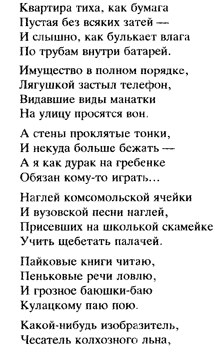
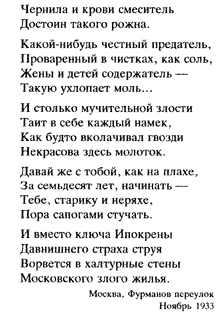
The flat is still like a sheet of paper—
Empty. Amenities? None.
And you hear the gurgling of liquids
Inside the radiator pipes.
Possessions are in complete order,
The telephone has frozen like a frog,
Belongings that have been around
Are pleading to get outside.
And the cursed walls are thin,
And there is no longer any escape—
And, like a buffoon playing on a comb,
I've got to perform for someone . . .
More brazen than a Komsomol cell,
More arrogant than a college song,
Perched for a while on a school bench
Sit executioners whom I've got to instruct in the twitter.
I read rationed books,
I catch cheap phrases,
And a terrible lullaby
I sing to the kulak baby boy.
Only some sort of depictor,
A comber of the kolkhoz flax,
An incestuous polluter of ink and blood
Deserves to be so impaled.
Only some sort of honest traitor,
Boiled through and through in the purges, like salt,
A keeper of his wife and children
Will rattle off twaddle like this . . .
And so much tormenting viciousness
Is hidden in every hint,
As though concealed nails have been hammered
Here by Nekrasov's hammer.
So let us, you and I—as if on a scaffold,
Past seventy,—begin again:
It's time for you, old man and slob,
To go tramping in your boots.
And in place of the Hippocrene's stream,
A stream of the old fear
Shall burst into the slapdash walls
Of an evil Moscow flat.[42]
The poem shows Mandelstam reasserting the combative persona of Hippolytus, who is rejecting, as once before, the incestuous advances of what was now the Soviet Russia-Phaedra. The time of acceptance of guilt, of the poet's resignation to being buried alive, had passed. He was now fitting the mask of the incestuous Oedipus on the young brood of Soviet poets whom, in exchange for the "slapdash . . . Moscow flat" (recall "The Streams of Slapdash"), the aging Hippolytus was obliged to coach in poetic diction. They, not the poet Mandelstam, would be engaged in the incestuous "polluting" of "ink" and blood (cf. chernila i krovi smesitel' and krovosmesitel' ), whereas he, a HIPPO lytus, whose rightful place is at the "spring of the horse," HIPPO crene, will have to make do with the "stream of the old fear. "[43]
Sometime in November 1933 Mandelstam finally pointed the accusing finger at Stalin, the demonic "other" of a true charismatic Russian poet, producing a searing epigram[44] —to my knowledge the only contemporary document of its kind—that a few months later would result in his arrest, with its profound psychological trauma, and subsequent exile.

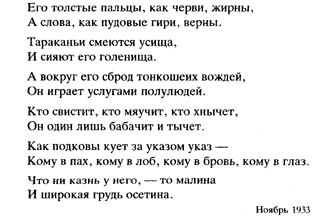
We live, sensing no country under our feet,
Our words can't be heard beyond ten paces,
And where there is enough for half a chat—
There the Kremlin mountaineer is mentioned.
His greasy fingers are, like worms, fat,
And his words, like big dumbbells, correct.
His roach mustachios grin,
The tops of his jackboots gleam.
Around him is the rabble of thin-necked leaders,
He toys with the favors of these half-humans.
This one whistles, that one meows, that one whimpers,
He alone is gruff and familiar.
He forges ukases one after another, like horseshoes—
One gets it in the groin, one in the head, one in the brow, one in the eye.
Each execution for him is a treat,
And the broad chest of an Ossete.[45]
This poem becomes a representation of the poet's "other" through one of the key metonyms of Mandelstam's narrative ofself-presentation, the "horseshoe," which enters into complex relationship with the central mythologies of his poetry: Hippolytus (incest, poetry, honor) and Joseph in Egypt (exile, slander, and injustice). The formulas are not cleanly delineated, but their entire complex may be defined as a hypothetical set of associations: poetry—Pegasus—Hippocrene—Hippolytus-and-Phaedra—the Bronze Horseman—history (Maiakovskii's "nag of history")[46] —the horseshoe good-luck charm (Verlaine's
bonne aventure )—poetry. This approximation of the complex of motifs is colored by chastity, ordeal, virtue, activity. The corresponding complex of "Oedipal" homologies is colored by the sense of guilt and resignation, an acceptance of the sentence of death pronounced by history. It was apparently the former set, characteristic of Mandelstam's Stone and the early Tristia, that was resurfacing in the early 1930s after Mandelstam's five years of poetic silence came to an end. Not surprisingly, his poetry displays a wealth of equestrian and racing imagery that is essentially focused on the poet's self:
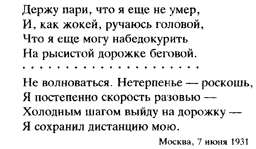
I'll bet with you that I haven't died yet,
And, like a jockey, I bet my head
That I can still do pranks
At a fast race track.
. . . . . . . . . . . . . . . . . . . . . . . . . . . . . . . . . . .
Stay calm. Impatience is too costly.
I'll gradually build up speed—
We'll enter the track at a cool trot—
I have preserved my distance.[47]
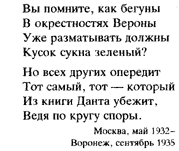
Do you remember how the race runners
Outside Verona,
Had to unroll
A piece of a green runner?
But ahead of them all
Will be that one, he who
Will run away from Dante's book,
Arguing in circles.[48]

When peace slips away like earth under hooves,
You'll say . . .[49]
Or consider these few lines, the last of which, it is now obvious, is a pun on the name of Phaedra's stepson, Hippolytus.

With every day, it is more difficult for me to breathe,
And yet, I can't postpone—
For it is for the pleasure of the race
That the heart of man and the heart of horse are born . . .[50]
"He who found the horseshoe" of Mandelstam's poetry received the good-luck charm of memory and the right of entry into the poetic "prestation," the poets' eternal exchange. To come across one of the horseshoes manufactured in Stalin's smithy was quite another matter. But the lofty horseman flying to Mount Parnassus could not do without the base and ridiculous Hephaestus. In the charismatic tradition to which Mandelstam belonged, the two tended to benefit from one another.
Hoofprints in the Black Earth
I am in the heart of the age, the way's uncertain
The road to the goal lengthens with time—
And my staff with its fatigued ash,
And my brass with its impoverished color.
OSIP MANDELSTAM (December 14, 1936)
It would be gratifying to think that Mandelstam, once he perceived the inexcusable brutality of the new state, never relinquished his insight. The record speaks otherwise. The poems of 1933 discussed previously are the exception rather than the rule. At least judging by the poetry
composed in Voronezh, Mandelstam once again was reaching for the rationalizations familiar from his writings of the 1920s and early 1930s, expanding them to include the grievously offended party. The figure of Stalin now came to haunt his verse, confronting him over and over again with the transgression for which the "Assyrian holding his heart," that other king, had nearly destroyed him but then had magnanimously granted a semireprieve.[51]
Mandelstam wrote a number of poems beginning in 1935 that deal with Stalin either directly or indirectly—as an expression of the poet's remorse and his desire to atone for his offense. In a 1935 poem, Mandelstam already calls himself a "nonparty Bolshevik, like all [my] friends [and] like this foe."[52] "I must live, breathing and bolshevizing myself (bol'sheveia )," are the words from another 1935 poem, in which he refers to the causes of his present predicament—his bourgeois social origins and the epigram—as "the damned seam, the clumsy prank" that had rendered him a pariah among people.
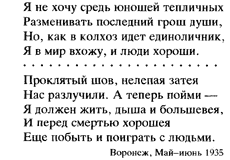
I do not wish, among the hothouse youth,
To change the last coin of my soul,
But, as a farmer joining the kolkhoz,
I come into the world, and people are good.
. . . . . . . . . . . . . . . . . . . . . . . . . . . . . . . . . . . . . . .
A damned seam, a clumsy prank,
Have separated us. So now keep in mind:
I must live, breathing and bolshevizing myself,
And, bettering myself before I die,
Be with people and play with them a little more.[53]
He even accepted the "corrective" nature of his exile. The poems that follow are a mythic Mandelstamian elaboration of a common sartorial-agrarian metaphor for socialist reeducation: repatterning, as in altering an old piece of clothing or an agrarian map. For Mandelstam,
whose poetic wardrobe contained Joseph's coat of many colors as well as the ephemeral Gogolian overcoat, this metaphor was doubly significant. It was placed, together with the first Soviet "talkie," Chapaev, a film about a heroic civil war cavalryman, in the service of Mandelstam's mythologies of pride and ordeal (Hippolytus) and eventual resurrection:

Measure me, my land, repattern me—
How miraculous is the heat of attached earth!—
Chapaev's rifle choked and sank—
Help me, untie the knot, pass a fair judgment![54]

The train was going to the Urals. Into our open mouths
The talking Chapaev was galloping from a sound film—
Behind a log fence, on a bedsheet tape—
To die and to spring back on your horse! [55]
Stalin, or rather his iconic features, begin to appear early in 1937, either simultaneously with the "Ode to Stalin" or shortly after it was finished. In "Sleep Defends My Don Drowsiness," one finds Stalin's metonyms pulled out of a propaganda poster: "The brow and the head of the militant armor are lovingly combined with the eyes.[56] Another poem alludes directly to the plea for mercy represented by the "Ode," and to its addressee: "It is to him—into his very core—I came, entering the Kremlin without a pass, tearing the canvas of distance, bowing my head heavy with guilt."[57] In still another Voronezh poem, "Had our enemies captured me," Mandelstam refers to Stalin by name.[58] Stalin even enters a love poem, addressed to a singer, Elekonida Popova: "My black-browed glory, tie me up with your thick brow, you, who are ready for life and death, who utter lovingly the thunderous name of Stalin with the tenderness of a vow, with love." This and a companion poem, both addressed to the "black-browed" admirer of Stalin, are tucked away in the Addenda of the fourth volume of Mandelstam's Collected Works.[59]
I do not intend to represent here the entire spectrum of the Voronezh poems, not even those that deal with the theme of exile. Many are politically neutral. Some have nothing to do with exile. Among those that do, several are free from official rationalization, as are the "little demon" poems where the Pushkinian-Gogolian-Dostoevskian trickster gets to be the "fall guy" in Mandelstam's misfortune. These poems show clearly that Mandelstam's "poet" would have been glad to withdraw from civic concerns. Nevertheless, they too belong to the "Ode" cycle.[60]
Elaborating once again on his central equestrian and eucharistic metaphors of poetry (properly speaking, synecdoches), Mandelstam was trying to separate his vocation as a poet from his preoccupations as a citizen, which had led to his arrest (the two "affairs" of the second stanza). The poem below, the first draft of this subset, shows how difficult it was for Mandelstam to give up the identity of a combative Hippolytus:
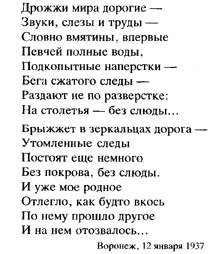
The dear leaven of the world—
Sounds, tears, and labors—
Almost like impressions for the first time
Filled with singing waters,
Underhoof thimbles—
Traces of a condensed race—
They grant not by rations:
Enough for centuries—not covered by mica . . .
The road is bursting, inlaid with little mirrors,
The tired imprints
Will stay like this a little longer—
Unshrouded, not covered by mica.
And my native and dear affair
Has slipped as if over and across it
There rode another one
And echoed itself in it . . .
The apparent conflict between the two stanzas intensifies in the next, somewhat later, version. Following the "eucharistic" first stanza, Mandelstam's funereal duo of resignation, the blind Oedipus and his guide Antigone, make their melancholy appearance. The water filling the hoofprints has now been changed in color to copper:
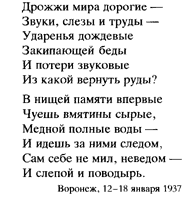
The dear leaven of the world—
Sounds, tears, and labors—
The rainbeats
Of misfortune coming to the boil
And the sonorous losses—
Out of what ore can they be reextracted?
In the impoverished memory for the first time
You sense raw holes,
Full of coppery water—
And you follow them,
Unhappy with yourself, unknown to yourself—
Both a blind man and a blind man's guide.[61]
Finally the blame is laid at the doorstep of the "little demon with wet fur," famous for egging on Dostoevsky's proud misfits (like Ippolit, with whom Mandelstam on occasion identified)[62] to commit the ever more embarrassing gaucheries. Equally important was the admission in the last stanza that the poet's civic honesty sidetracked and de-
stroyed him—"kicked off the axle." This pun ("axle"—os' —os ip Mandelstam) recalls not only the poet's name but also, of course, the crash of Hippolytus's chariot at the conclusion of the eponymous tragedy. Couched in language imitating the dialect of rural Russia, these refined Petersburg "mythologies" make for bitterly ironic reading:
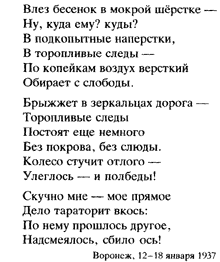
The little demon, his fur wet, has climbed in—
What's he doin' here? Where's he goin'?
Into the underhoof thimbles,
Into the rushed imprints.
It's the kopeck tax on the rationed air
That he is collecting from the town folk.
The road is bursting, inlaid with little mirrors—
The rushed imprints
Will stay like this a little longer
Unshrouded, not covered by mica.
The wheel bangs, slipping from its axle—
The affair is settled—it's not half-bad!
I am bored—my straight
Affair [and/or criminal case] is clanging, slipping from its axle:
Another one rode over it,
Had a laugh, kicked out the axle!
This harmlessly apolitical verse notwithstanding, the other poems do represent a coherent entity, demonstrating that Mandelstam was more of a man of his times than either he[63] or many of those who have
written about him have been willing to admit. Even Nadezhda Mandelstam, with her canonical image of the poet, has insisted: "All of us led a double existence, and no one could avoid that fate." For Mandelstam's "poet" this was a double existence in yet another sense: he could not disentangle himself from a poetics in which the charisma of the author was predicated on the authority of a supreme ruler assigned the role of the poet's other. The "Ode to Stalin" shows how intimately intertwined these four aspects of the poet's existence actually were.
The Story of The "Ode"
If manuscripts do not burn, as Mikhail Bulgakov once suggested, they at least get hot sitting in the fire, which is more or less what happened to the "Ode to Stalin." The first indication that Mandelstam might have written something like the "Ode" came from Anna Akhmatova's recollections of Mandelstam and had the effect of a minor literary bombshell.[64] Two years later, in 1967, the issue was taken up by Clarence Brown, who had been working on Mandelstam for nearly a decade.[65] To determine whether Mandelstam had actually written the "Ode," Brown analyzed some twenty-four poems composed during the Voronezh exile (1935–37), relating them to what he had been able to find out about the poet's life at that time. The conclusion of this first thorough, and still timely, study of the later Mandelstam was largely negative. Hard as he tried, Mandelstam—it would seem—was unable to twist the arm of his muse, even though he knew very well that a panegyric to Stalin might assure him continued existence.
There was, however, evidence to the contrary, including Akhmatova's authoritative statement and a number of powerful poems composed in Voronezh exile. Among the most remarkable is a poem that does as much justice to Mandelstam's poetics of anamnesis (it ranges from the Lay of Igor's Campaign to Rembrandt's Night Watch, to Pushkin's "Monument," to Pasternak's cycle "Artist") as it does to the nightmares of anticipated imprisonment and the paranoid enthusiasm gripping the nation in 1937 in a double Stalinist embrace.
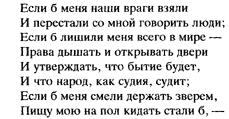
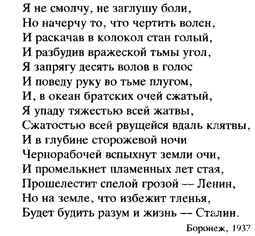
Had our enemies captured me
And had people stopped speaking to me;
Had I been deprived of everything in the world—
The right to breathe, and to open doors,
And to assert that "being" means "shall be,"
And that the people, like the judge, judges;
Were I to be kept like a beast,
My food thrown on the floor,—
I wouldn't be silent, I wouldn't suppress the pain,
But I shall draw pictures I wish to draw,
And rocking the bell of the naked walls,
And having awakened the corner of the enemy darkness,
I shall harness my voice to ten bullocks,
And cleave the dark with my hand like a plough,
And in the depth of the watchful night,
The eyes of the common laborer earth shall flash
And, into the united legion of fraternal eyes,
I shall fall with the weight of the whole harvest,
With all the denseness of an oath tearing into distance,
And the flock of the flaming years will come, flying,
Like a ripe thunderstorm, will rustle past—Lenin,
And on the earth that will avoid decay,
Reason and life will be kept awake by Stalin.[66]
Pieces like this kept the puzzle unresolved. And since they did not fit the otherwise satisfying picture of a poet incapable of violating the integrity of his talent, Brown decided to defer his final judgment, hoping that more conclusive evidence might eventually turn up.
The problem was resolved by Nadezhda Mandelstam. In the first
book of her memoirs, published in 1970, she acknowledged Mandelstam's composition of the "Ode," adding that she had preserved the complete text of it for fear it would otherwise have survived in the "wild versions circulating in 1937."[67] It was not until 1975 that the poem itself, albeit seven lines short of complete, made its first appearance in print, published in the Slavic Review by an anonymous contributor.[68] A few months later a fuller version was included in a brief essay by Bengt Jangfeldt. In one important respect, Jangfeldt's account complemented, if not contradicted, that of the poet's widow. He cites an unnamed friend of the Mandelstams who, contrary to Nadezhda Mandelstam's assertion, maintained that the poet "was not at all ashamed of the 'Stalin verses' . . . and read them on several occasions after his return from the Voronezh exile." A complete version of the "Ode," presumably supplied by Nadezhda Mandelstam herself, had to await the publication of the fourth volume of Mandelstam's Collected Works, issued in Paris in 1980.[69]
What we know about the events surrounding the composition of the "Ode to Stalin" comes from the poet's correspondence and the memoirs of Nadezhda Mandelstam, who, alone among her husband's companions in Voronezh, has chosen to make her recollections public.[70] Following is a brief account, based essentially on her story.
The poem was composed sometime in January 1937, which places it in the middle of the Second Voronezh Notebook,[71] when Mandelstam's exile in Voronezh was coming to an end. Increasingly apprehensiveindeed, desperate—about his future, Mandelstam decided to buy his way out by paying Stalin in poetic kind, that is, by composing a paean in his honor. This was a realistic response to a situation growing grimmer by the day. Mandelstam's fellow exiles whom he befriended in Voronezh were being rearrested one by one.[72] The Voronezh Theater that had previously offered Mandelstam an opportunity to earn a meager income no longer wanted anything to do with him. Graver still, the Voronezh section of the Writers' Union, supposed to supervise the poet's ideological reeducation, had ceased to respond to his requests for work or assistance.[73] But perhaps worst of all for Mandelstam, the fear of dealing with a poet in disgrace was now threatening to sever the last links connecting him with the literary community on the "mainland."[74] Reading Mandelstam's correspondence of those months, it is especially painful to realize that many of his pleas, not just for financial assistance or intercession but merely for an acknowledgment of his existence, went unanswered. This social isolation, intense to begin with, was made doubly unbearable by Mandelstam's health, which was
deteriorating rapidly under the stress of continuous harassment. The suddenness with which Mandelstam was reduced to these most minimal circumstances, too, must have caused considerable pain.
A letter to K. I. Chukovskii, written early in 1937 after the "Ode" had been finished and while his wife was either in or on her way to Moscow, testifies to Mandelstam's desperate state at the end of his term of exile:
Dear Kornei Ivanovich!
What is happening to me—cannot continue any longer. Neither my wife nor I is capable of enduring this horror any longer. Moreover, we have come to a decision to terminate all of this by whatever means. This is not a "temporary residence in Voronezh," an "administrative exile," etc. Here is what it is: a man who has gone through a most acute psychosis (more precisely, exhausting and grim madness)—right after this illness, after an attempt at suicide, physically crippled—this man took up work. I said—my judges are in the right. I have found all of this historically meaningful. All right. I worked at breakneck speed. In return I got beatings. I was ostracized. I was morally tortured. Still, I went on working. I thought it a miracle to have access to work. I gave up pride. I thought our entire life a miracle. A year and a half later, I became an invalid. By that time, without any guilt on my part, everything had been taken away from me: the right to live, to work, to medical care. I have been reduced to the status of a dog, a cur . . . I am a shadow. I do not exist. All I have is the right to die. My wife and I are being prompted to commit suicide. Turning to the Writers' Union is no use. They will wash their hands of it. There is only one man in the world who can and must be appealed to with this matter. People write to him only when they consider it their duty to do so. I cannot give guarantees for myself, I cannot put a value on myself. I am not speaking about my own letter. If you want to save me from an unavoidable end—to save two people—help, plead with others to write [on my behalf]. It is ridiculous to think that this may "hit back" those who would agree [to write]. There is no other way out. This is the only historical way out. But do understand: we refuse to delay our agony. Each time I let my wife go away, I become psychologically ill. It is dreadful to look at her—she is so sick. Just think: WHY is she going [to Moscow]? What does our life hang on? I will not serve another term of exile. I can't.
O. Mandelstam
My illness. I cannot remain "alone" for a moment. Now my wife's mother, an elderly woman, has come to stay with me. If I am left alone—I'll be placed in a madhouse.[75]
Even after his arrest in May 1934, Mandelstam still had the stature of a major literary figure whose misfortune could encourage a number of prominent writers to express their "concern." It was ostensibly on their behalf that N. Bukharin, though unaware of the exact nature of the accusation against Mandelstam, petitioned Stalin. Stalin, in turn, grew sufficiently alarmed about the negative publicity in the writers' community to take it upon himself personally to counteract it by telephoning Boris Pasternak, who, it was rumored, was being groomed for the position of "first Soviet poet."[76] The story of their conversation has been told more than once,[77] but it is so characteristic of the special relationship between the state authority and literary authorship in modern Russia that it deserves more than a passing mention here.
Sometime in 1934 the great leader, whose cult was already in full bloom, telephoned one of the top members of what Solzhenitsyn called Russia's "second government," who happened to be living in a communal apartment. After assuring Pasternak that he did not need to worry about Mandelstam—that Mandelstam's case was under review and would be favorably settled—Stalin, it appears, decided to stage a little provocation, to force Pasternak to admit his friendship with Mandelstam and, by implication, his knowledge of the offending poem. "Why did you not appeal to me directly?" he is reported to have said. "I would have been climbing walls if I'd known that my friend had been arrested. He is your friend, isn't he?" Pasternak parried the question by suggesting that "poets, like women, feel jealous of each other." Without pausing for a transition, Stalin went on to his next question: "But he is a master, a master?" It would seem he was worried that the offending epigram might stick if Mandelstam was indeed a great poet.[78] "This is beside the point," Pasternak replied. "And why are we talking about Mandelstam and only Mandelstam? I've wanted to meet with you for a long time and have a serious discussion." "What about?" "About life and death." Stalin hung up. His attempt at diffusing the concern of the literary community marked the beginning of Mandelstam's transformation from a poet of the first magnitude into a nonperson—a forgotten author denied even the offensive effectiveness of his gift. By 1937, this process was very nearly complete.
Loss of face, disease, fear, financial ruin—any one of these might serve as a good excuse for bowing to the authorities, and in combination they no doubt justify an outward display of contrition and awe before an almighty tyrant. Yet the circumstances under which the "Ode" was composed appear to be more complex, and Nadezhda Mandelstam went further to suggest that her husband for a while (but
how long?) assumed the mentality of the contemporary crowd. "In order to write such an 'Ode' it is necessary to tune oneself like a musical instrument, to consciously yield to the common hypnosis, to cast a spell over oneself with the words of the liturgy, which, in our day, muffled all human voices."[79] The tone of profound sincerity in the "Ode" and the consummate skill of its composition demonstrate that the poet's perfect pitch worked, even in this instance, without fail.
But perhaps the word "even" is inappropriate here, for there is hardly anything unusual in a poet's (or anybody's, for that matter) fascination with an omnipotent leader who has enjoyed a litany of praise for almost a decade. Poetry of the Napoleonic era abounds in such examples. Nor is it unusual for a victim to identify with his tormentor, especially if the tormentor happens to be exalted and the victim either physically or psychologically isolated. Bruno Bettelheim's analysis of the "Heil Hitler" salute and the effect of its adoption by anti-Nazi Germans is instructive in this regard,[80] as are the pleas of Ovid, the archetypal exile for poets and especially for Mandelstam. It is also worth recalling that Dostoevsky's political conversion occurred under similar circumstances (or so it seems). The composition of the "Ode," then, as that of any significant work of art, appears overdetermined. Fear, misery, practical considerations, and, most important, the tradition of projecting the attributes of an autocrat onto the "archetypal" poet (Pushkin and Alexander I and Nicholas I; Lermontov and Nicholas I) must all have been at work as Mandelstam was "tuning himself" for the composition of this magnificent paean. But even more than that was involved.
For the "Ode" to come into being, the emotional state of the poet had to be objectified, had to locate itself in that ideological space where contemporary consciousness overlapped with the "mythologies" the poet superimposed onto the world: his poetics, his myths, his beliefs—in sum, the ideology with which he made sense of the world.[81] Without such objectification, Mandelstam's expressive resources would have remained untapped, and the "Ode," had it come into existence at all, would not have risen above the Stalin doggerels of the kind that Akhmatova produced after the Second World War, when the noose around her neck was once again beginning to tighten.[82] Was there anything in Mandelstam's frame of reference capable of accommodating such an enterprise?
Two Josephs
You are king. Live by yourself.
ALEKSANDR PUSHKIN, "For a Poet"
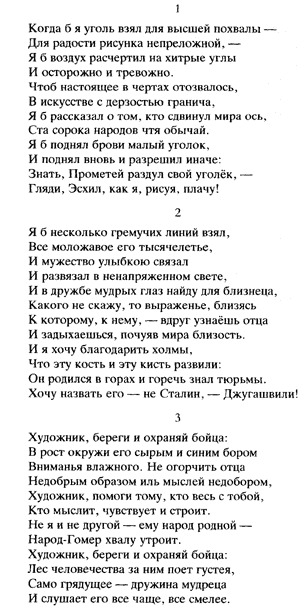
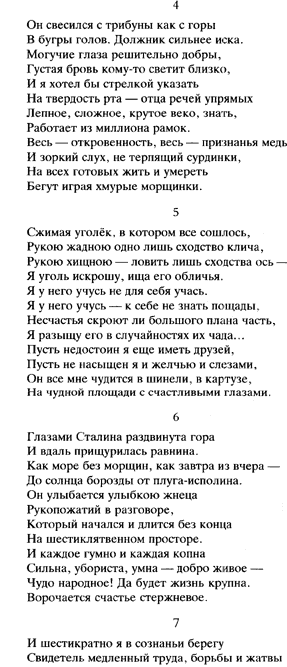
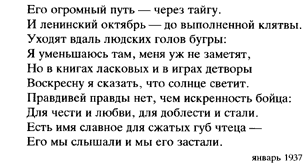
1
Were I to take up the charcoal for the sake of supreme praise—
For the sake of the eternal joy of drawing—
I would divide the air into clever angles
Both carefully and anxiously.
To make the present echo in his features
(My art bordering on audacity),
I would speak about him who has shifted the world's axis
Honoring the customs of one hundred and forty peoples.
I would lift a small corner of his brow
And lift it again, and redraw it differently:
Oh, it must be Prometheus blowing on his coal—
Look, Aeschylus, how I weep as I am drawing.
2
I would take a few thunderous lines,
His youthful millennium entire,
And would bind his courage with his smile,
And let it loose again, illuminated softly.
And in the friendship of his wise eyes, I shall find for the twin
(I won't say who he is) that expression, drawing close to
Which, to him—you suddenly recognize the father
And gasp, sensing the proximity of the world.
And I want to thank the hills
That have shaped this bone and this hand:
He was born in the mountains and knew the bitterness of jail.
I want to call him, not Stalin,—Dzhugashvili!
3
Artist, cherish and guard the warrior:
Surround him entire with a damp blue forest
Of moist concern. Do not upset the father
With an unwholesome image or an inferior thought.
Artist, help him who is with you completely,
Who is thinking, feeling, and building.
Not I, no, not another—his dear people—
The Homer-people will offer him a triple praise.
Artist, cherish and guard the warrior:
The forest of mankind growing ever denser is singing behind him,
The future itself is this wise man's retinue,
And it heeds him more and more often, with ever greater daring.
4
He is bending over a podium as if over a mountain
Into the hillocks of heads. A debtor stronger than any claim.
His mighty eyes are decisively kind,
His thick eyebrow is glaring at somebody,
And I would like to mark with an arrow
The firmness of his mouth—the father of stubborn speeches;
His eyelid, sculpted, complicated and abrupt,
Projects, verily, out of a million frames.
He is—all sincerity, he is—all brass of fame.
And his farsighted hearing is intolerant to muffling.
His careworn little wrinkles are playfully stretching
To reach out to all who are ready for living and dying.
5
Grasping the charcoal, the focus of everything,
Summoning with a greedy hand the likeness alone,
With a rapacious hand—to catch only the axis of likeness-
I shall make the coal crumble, searching out his features.
I am learning from him, but learning not for my own sake,
I am learning from him to be merciless to myself.
Should even a part of his great plan be hidden by misfortunes,
I'll seek him out in the fumes of these accidents . . .
Granted, I am still unworthy of having friends,
Granted, I have not yet been sated with gall or tears,
Still, I sense his presence: in his military coat and cap
He is standing in the miraculous square, his eyes happy.
6
The mountain came apart under Stalin's eyes,
And the plain is squinting into the distance.
Like a sea without wrinkles, like tomorrow out of yesterday—
The furrows of a colossal plough reach to the sun.
He is smiling with the smile of a harvester
Of handshakes in the conversation,
Which once began and has continued since, without end
On the expanse of his six oaths.
And each threshing-floor, and each sheaf
Is strong, fit, and clever—living wealth—
People's miracle! May life be large.
The axle of happiness keeps on tossing and turning.
7
And six times over I cherish in my mind—
A slow witness of labors, struggles, harvests—
The enormous distance he has traversed across the taiga,
And from the Leninist October—to the fulfilled oath.
The hillocks of people's heads are growing more distant:
I am diminishing in them, won't even be noticed,
But in tender books and in children's games,
I shall be resurrected to say that the sun—shines.
No truer truth exists than a warrior's sincerity:
For honor and love, for valor and steel,
There is a glorious name made for the taut lips of a rhapsode—
We've heard it, we lived to see him.
No other Stalin-related poem has the scope of the "Ode." It is the second longest poem ever composed by Mandelstam (after "He Who Found a Horseshoe"), and its thematic breadth offers a unique entry into the conceptual and mythic world of his later poetry. Mandelstam's idea of himself and his art, his view of his "crime" and approaching death, his vision of Stalin and the posthumous life of his poetry—all are contained in the "Ode" and are presented with a skill that would have been appreciated in the Greece of the tyrants or Augustan Rome and should, therefore, be of aesthetic value in our own day. To judge by formal features alone, the poem belongs to one of the most difficult genres of panegyric poetry, the Pindaric ode. The exuberant imagery framed in the rhetoric of praise, triadic divisions within stanzas that follow the pattern of strophe, antistrophe, and epode, and finally the lines of unequal length combining hexameter, pentameter, and tetrameter conform to the basic scheme of the ancient genre of glorifying a supreme leader.[83] Such a strict adherence to the Pindaric rules is unknown to the mainstream of the Russian odic tradition, which may in part explain why the editors published the poem under a provisional title, "Verses on Stalin." It is safe to assume that Mandelstam, who must have been aware of his priority in the genre, wished to produce something unique—a fitting tribute from a great master of verbal art to a great master of political power.
Among the letters he wrote upon finishing the "Ode" is one addressed to the authority on the genre, a critic who had praised Mandelstam's poetry as "philosophical odes," Iurii Tynianov. The poem, although it was not mentioned explicitly, served as a hidden focal
point of the letter—a subtle, implicit tuning of the reader to the wavelength of the "genre." Alluding to the now sinister-sounding words of Trotsky, "In the beginning was the deed [delo, also a criminal case], and the word followed as its phonetic shadow," Mandelstam was appealing to literary loyalties of the 1920s, seeking to convince one of the foremost literary scholars, novelists, and screen writers of the decade that he deserved the attention afforded the dead classics of Russian literature:
Dear Iurii Nikolaevich!
I want to see you. What can I do about it? It's a legitimate wish.
Please, do not consider me a shadow. I still cast one. But of late I am becoming comprehensible decisively to all. This is menacing. For a quarter of a century now, mixing the serious with trifles, I have been flowing into Russian poetry; but soon my verse will fuse with it, having altered certain elements in its structure and composition.
It is easy not to answer my letter. To justify abstaining from writing a letter or a note is impossible. You shall do according to your wishes.
Your O.M.[84]
The "oceanic" metaphor of poetry here[85] represents, in fact, a double entendre, since the word naplyvat' (to flow, as in "ebb and flow") denotes also the technique of a cinematic closeup, and thus it refers both to Mandelstam's poetics of metapoetry (the Formalist foregrounding of the device) and to the cinematic perspective realized in the "Ode." Tynianov, who used cinematic techniques in his own novels,[86] was one of a small number of people on whom such prompting would not have been lost.
The poem begins with a traditional poetic conceit for expressing the ineffable: if only the poet possessed the limitless power of representation, he would sketch with a charcoal across the firmament of heaven the portrait of the one who had "shifted the world's axis" (or axle). The purpose of this conceit was to convert the poet's confessed inadequacy into an affirmation of his creative gift at a higher rate of exchange. In an unspoken competition, Mandelstam invited Aeschylus to watch him "weep as [he is] drawing"—with the flaming coal of Prometheus. Transcending pain, the poet will offer a pictorial tribute to Stalin in the form of a long-overdue atonement for the transgression of Prometheus that had once angered Stalin's counterpart in the pantheon of Greek deities. The second stanza, as it continues the theme of representation, introduces another conceit central to the "Ode": a rapturous search for Stalin's likeness.
His aim will be achieved, Mandelstam says enigmatically, after he produces a twin (bliznets ) whose identity he pointedly refuses to disclose. Yet in his features one would recognize the face of the "father" and "gasp" from the closeness of the essence of the world, a feeling Aleksandr Blok had once, resorting to identical rhetoric,[87] associated with the revolution. The third stanza exhorts artists not to misrepresent the leader, now called the "warrior" (boets ) and again the "father" (otets ). The main part of the poem begins with the fourth stanza, again canvaslike or cinematographic in quality: Stalin is addressing the "hillocks of heads" from a mountainlike podium. Remarkably, this portrait appears to derive from a newsreel of Lenin addressing a crowd in Sverdlov Square on May 5, 1920—a prototype for many a Lenin poster. This substitution is doubly significant: first because Stalin was not known for his oratorical skill, and second because Lenin, who was a skillful speaker, is missing from the "Ode" (except by attribute and implication). In 1937 such an omission was rare and therefore meaningful even in the unabashedly worshipful Soviet folklore of those days.[88]
In the fifth stanza, Mandelstam returns to the subject of his craft and speaks about the technique he employs in drawing the portrait of Stalin. Only in this section does Mandelstam disclose the nature of his relation to his subject, whose portrait is once again composed from bits and pieces of propaganda placards.
In the sixth stanza, Mandelstam goes on to describe the transformation of the earth under the power of Stalin's vision (a trompe l'oeil, one is tempted to say): Stalin's eyes make a mountain come apart, opening to view a cultivated plain with furrows stretching into the sunset. The "sixfold oath" that describes this field of plenty refers to Stalin's funeral oration for Lenin: "We vow to thee, Comrade Lenin," and so forth, six times and, possibly, Stalin's "six conditions for industrialization."[89] In order to emphasize the magical, or miraculous, nature of the transformation, Mandelstam suddenly shifts to trochee—Chudo narodnoe! (People's miracle!)—creating a metrical equivalent of the Greek spondee. Although not unusual for the Russian iambic, such a shift, as Mandelstam may have learned from Viacheslav Ivanov, served to mark an epiphany in sacred Greek poetry.[90] Appropriately, this line also contains an element of an archetypal verbal formula with which God brought forth the universe: Da budet zhisn' krupna (Let there be large life, or Let life be large).
The poem's coda (stanza seven) has three distinct parts. In the first, the poet recalls Stalin's life six times, partly in reference to the sixfold oath and partly in allusion to the six days of Creation. He then expresses the hope that his own art will survive him and will benefit fu-
ture generations, and finally, he thanks fate for having allowed him to be a contemporary of the man who embodies honor and love, valor and steel-like firmness. Not surprisingly, the last rhyme is a paronym of Stalin (stali, zastali ), prompting a few thoughts on magic spells and riddles that paronymically encode names of deities or spirits to whom an enchanter makes an appeal.
Intended in part as a masterful example of official Stalinist literature, the "Ode" had to absorb contemporary official rhetoric with all its maniacal verbosity. Consider, for example, the following greeting to Stalin, "telephoned" to Moscow by the Congress of Iakutian Soviets who had just finished debating the project of the Stalin constitution:
And our first thought, our first word, is addressed to you, our dear leader and teacher, father and friend Iosif Vissarionovich! We have no words to express our gratitude and love for you, the creator of the new Constitution—this charter [Magna Carta?] of the socialist peoples. . . . You have made a vow over Lenin's sepulcher to fulfill Lenin's commandment. . . . Have the Iakutian people ever dreamed that they would have in abundance, not only bread, meat, and butter, but vegetables whose massive growth has until recently been considered a miracle. . . . We vow a holy vow: to cherish, to preserve, . . . to broaden further the Stakhanovite movement that you have brought forth.[91]
In fact, the Promethean motif, too, was a commonplace among the paeans to the great Socialist construction, as "Prometheus Unbound" by a Belorussian poet lakub Kolos should indicate (it appeared in the same October issue of Izvestiia ):
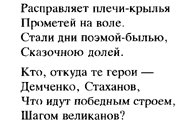
Stretching his shoulder—wings,
Prometheus is free.
Days have become an epic poem,
A fairy tale come true.
Who and where from are these heroes—
Demchenko, Stakhanov—
That are marching in a triumphant formation
At the pace of giants?
Stakhanov, it may be recalled, was a miner, whence his association with the Titans—one of them the father of Prometheus—imprisoned in the bowels of the earth.[92] Indeed, as Mandelstam was complaining to Tynianov, his poetry was becoming comprehensible.
Viewed from an intrinsic perspective, the "Ode to Stalin" functions as a keystone in a cycle consisting of some twenty-four poems written between December 1936 and February 1937.[93] Some of them, such as the "twin" poems dealing with a statue of a Buddha-like deity residing inside a mountain,[94] are barely comprehensible without the "Ode," whereas others acquire a new, fuller meaning that would otherwise have been lost. For example, one is tempted to see features of Stalin in the "cat" from the "Kashchei" poem.[95] A particularly striking insight is produced when the "Ode" is juxtaposed with the "wasps" poem. Clarence Brown suspected a link between this poem and the "Ode,"[96] and Nadezhda Mandelstam, who unlike him had access to both texts, pointed out that the two have a central image in common: the "axis," or os'.[97] In the "Ode," Stalin is called the one who "had shifted the world's axis" (stanza 1), and the word appears once again in stanza 5, where Mandelstam develops the theme of his relation to Stalin. Attempting to "catch the likeness" of his subject, the poet isolates the essence of Stalin's appearance, the core, which he refers to as the "axis of likeness" (skhodstva os' ). The nature of this latter axis is broached in the second stanza, where Mandelstam introduces a mysterious "twin" of his subject in whose features one is bound to recognize the father.
The choice of the word "twin" for the poet's representation of Stalin was far from random. To begin with, it resonated with Pasternak's choice of an equivalent image in his "Stalin" poem, one of the two published in the first January issue of Izvestiia in 1936.[98] Like Mandelstam's, Pasternak's "twin" (Pasternak used the more colloquial dvoinia ) was a mysterious creature whose identity was nowhere explicitly defined but whose attributes suggested a christological image—shared by poets, precursors, and leaders alike. Below are the first five stanzas of the poem, as it appeared in the newspaper (italics are mine):

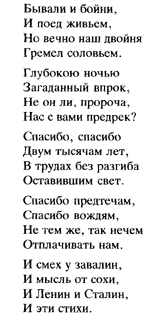
I have realized: all's alive.
Centuries won't perish,
And life without accumulated wealth
Is an enviable fortune.
There have been slaughters before,
And the devouring of the living,
But our twin forever
Thundered like a nightingale.
In the deep night,
Thought up to last a long time,
Wasn't it he who, prophesying,
Predicted you and me.
Thanks and thanks again
To the two thousand years
That, laboring without unbending,
Have left this world.
Thanks be to the precursors,
Thanks be to the leaders,
If not in the same kind,
We'll have nothing to repay with.
And the laughter outside peasants' huts
And thought coming from the plough,
And Lenin and Stalin,
And these verses.
One can imagine that Pasternak's "idea," fundamental to the charismatic mission of a Russian poet, struck Mandelstam as highly appropriate when he was "tuning himself" for the composition of the "Ode." An equally pertinent suggestion was contained in the other of Pasternak's Izvestiia poems, "Obstreperous Temperament Is to My Liking." I quote the conclusion:
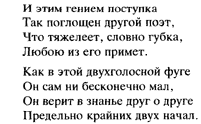
And this genius of action
Is so absorbing for the other poet,
Who fills himself heavy, like a sponge,
With any of his features
However small he himself is
In this double-voiced fugue,
He believes in the mutual awareness of each other of
These infinitely diametrical essences.
This motif of "doubling" resonated powerfully with Pasternak's earliest collection, Bliznets v tuchakh (The Twin in Storm Clouds, 1914), the title of which yielded easily to a narrative elaboration: a fellow-poet (Pasternak's "twin") drafting in the stormy sky that had gathered over his head the "thunderous" outlines of his other "twin," the "fatherly" Joseph Stalin.[99] In a letter to Pasternak written on January 2, 1937, when the "Ode" was almost or entirely completed, Mandelstam appears to allude to this borrowing via a "contiguous" citation of the key word in Pasternak's first line: "Thank you for all and for the fact that 'all' is 'not all yet.'"[100]
In the third stanza, the "father" and the twin are presented in their martial aspect, emphasized by the rhyming scheme: otets-bliznets-boets. In the fourth stanza, where the first real portrait of Stalin appears—a posterlike image of Stalin addressing the crowd—Mandelstam refers to
his subject as a "debtor stronger than any claim" (dolzhnik sil'nee iska ) and, once again, as "father." The insistence on the paternity of Stalin echoes the Old Testament with its paternalistic symbolism, and we indeed encounter a similar "debtor" formula in Psalms: "The Lord hath sworn and will not repent,"[101] or "My covenant will I not break . . . Once I have sworn by my holiness that I will not lie unto David." The formula itself, however, stands at the core of Mandelstam's conception of poetic "prestation," poetry as an ever-continuing exchange of gifts, which here manifests itself as a transcendent contractual agreement between the supernatural figure of the "father," whose gifts are inexhaustible, and his "children," whose "claims" could never exceed his magnanimity—a potlatch in which the father always triumphs.
But how does the poet define himself in relation to Stalin the father? The answer is found in stanza 5, which becomes transparent when juxtaposed with Mandelstam's 1937 "wasps" poem:

Armed with the eyesight of slender wasps
Sucking the earth's axis, the earth's axis,
I sense all that I have ever encountered
And recall by heart and profanely.[102]
Even though the choice of "wasps" may have been determined by Mandelstam's reading of Bergson, who considered these insects the paragons of intuitive perception,[103] the poem's "poetics" are defined by paronomasia, in this case a play on the phonetic similarity between the genitive plural of osa: os; the accusative singular of the word axis: os'; the ending of the verb signifying an unpremeditated encounter: prishlos'; and, of course, the vocative form of his own first name Osip: Os', a contraction of "Joseph," the name he happened to share with Stalin.[104] "Solominka," a famous poetic declaration of the earlier Mandelstam, is constructed on such a play on first names,[105] and in the "Ode" the poet exploited the potential of the remarkable coincidence, transforming it into a likeness. A careful reading of the fifth stanza demonstrates that Mandelstam made the coincidence work for him with supreme mastery.
Image and Likeness
The similitude that Mandelstam sought with such fervor as he was sketching in the air the portrait of Stalin, as he was creating the "twin," involved not only the morphological essence of Stalin's face (a portrait arranged around the axis of facial symmetry) but also—indeed, primarily—the identity between his famous tormentor and himself. This identification of the poet's persona with the subject of his poetic portrait is common in poetic iconography[106] and is related to confessional literature, both medieval and modern.[107] But it had a special significance for the tradition in which an author's place in the culture was in large measure predicated on his capacity to project onto himself, by means of challenge, the aura of the focused, charismatic authority of the supreme ruler.
The authority of one both undermined and supported the authority of the other in a relation of mutually reinforced rivalry. This conflict the "Ode" was meant to resolve by drawing on the paternalistic vocabulary of the Stalin cult[108] while making the Aeschylean version of the myth of Prometheus coextensive with the sacred narrative about the Son and the Father.[109] Consider the fifth stanza: "Granted, I have not been sated with gall or tears" (line 10). Here, the poem's artist with a burning coal in his hand (recall Prometheus, Pushkin's "The Prophet," and the calling of Isaiah) wore the transparent mask of the one who accepted the bitter cup predestined for him by his Father.[110] To leave no doubt about the parallelism—a kenotic imitatio Christi —Mandelstam offers a prophecy concerning his own resurrection in the final stanza: "in tender books and in children's games, I shall be resurrected to say that the sun—shines." But what can this imitation of Christ's voluntary submission to an ordeal have to do with the pagan myth of Prometheus that opens the poem?
The conjuncture of the two narratives bore the unmistakable signature of Mandelstam, "the last Helleno-Christian poet,"[111] who had once imagined that a poet's life resembled a "game played by the Father with His children" ("Pushkin and Skriabin"). This view of "Christian art" defined the use of the Aeschylean myth in the "Ode to Stalin." The story of Joseph the dreamer who was once Pharaoh's prisoner was also summoned up to effect the transition from a relationship of conflict to one of indispensable service and ultimate identification (neither of the namesakes was an ethnic Russian). Prometheus of Aeschylus, recalled at the outset, passed almost imperceptibly into another mythic register where the guilty poet, his once-misused creative gift, and the Zeus of the Soviet Olympus could be presented as, respectively, Christ and God
the Father. After all, Prometheus, like Christ, was a transgressor with respect to established authority. But his offense, even though beneficial for mankind, served to set the tragic cycle in motion, whereas Christ's much later violation of the Law and his subsequent Crucifixion put the tragic cycle to rest. Mandelstam's personal misfortune thus recapitulated the religious and moral evolution of humanity—or, to put it differently, the phylogeny of history was recapitulated in the ontogeny of Mandelstam.
Emphasizing the dynamic aspect in the development of the "Ode's" central myth, that is, by having the Christian view supersede its Greek counterpart, Mandelstam was pleading for a different interpretation of his predicament, integrating it into the framework of universal Christian redemption and forgiveness. "Where is the bound and nailed-down groan, Where is Prometheus—the rock's support and likeness? . . . That is not to be—tragedies cannot be brought back," wrote Mandelstam shortly after completing the "Ode," almost in an attempt to exorcise the tragic pattern from his own life.[112]
The "Ode to Stalin," too, seems to have been meant as an exorcism, at least to the extent that it bore some features of an elaborate magic spell. The coincidences of the first name of the poet and his addressee and the talismanic "charcoal" point to such a pattern. Before Mandelstam, the burning coal of the archetypal rebel had touched the lips of the prophet Isaiah, replaced the heart of Pushkin's Prophet, and in more recent times—and mined in fabulous quantities—earned a singular fame for Stakhanov (one can expect an Acmeist Mandelstam to outline his paradigms with this kind of precision). Such a history is bound to confer transcendent powers on the mineral, transforming it, by contagion,[113] not only into a magical tool with which to fashion a fitting image of Stalin but also into a talisman that would grant the poet his wishes. This was not the first time Mandelstam had occasion to recall Pushkin's "talismanic" words: "Guard me in the days of persecution, / In the days of remorse and agitation: / You were given me on the day of sorrow."[114]
Finally, the structure of the poem provides an even stronger indication of a magical subtext, for the "Ode" follows the twofold formula of a homeopathic spell,[115] that is, one based on analogy or comparison.[116] The first part of such a spell recounts a phenomenon that has already taken place—here the development of tragedy into the Christ event—and the second contains a wish for a similar outcome with respect to an unrelated but in some ways comparable situationMandelstam's desire to have his predicament interpreted within the Christian rather than the Promethean or Old Testament framework.
Thus the initial analogy with Prometheus would yield to the desired imitatio Christi, the "stolen fire" to the magnanimity of the "debtor stronger than any claim," and the angry Zeus-Stalin to God the Father.
This Helleno-Christian myth, tragic and heroic as well as kenotic and redemptive in its specific generation in the "Ode," became the foundation (a concealed one, as myths require) [117] of a book that more than any other work contributed to Mandelstam's revival: the two volumes of Nadezhda Mandelstam's memoirs. There, of course, Stalin was revealed as a false god, but the "Ode"'s pattern of self-presentation, the "twins," could function well without him: the "prodigal son" could practice his divine gift and even return to his Father.[118] The very first paragraph of her memoirs defines the reader's frame of reference, tuning him to the correct "mythology," once again imperceptibly, as myths require, and establishing a theme that will inform the entire narrative like a Wagnerian leitmotiv:
Having slapped Aleksei Tolstoy [the author of the famous Road to Calvary ], O. M. without delay returned to Moscow and there telephoned Anna Andreevna [Akhmatova] every day, pleading with her to come to Moscow. She tarried; he was getting angry. With her ticket purchased and ready to go, she paused by the window and became pensive. "Praying that this cup may pass you?" asked Punin, an intelligent, bilious, and brilliant man. It was he who suddenly said to Akhmatova, as they were strolling through the Tretiakov Gallery: "And now let us look how you are going to be conveyed to the execution" [reference to Surikov's "Boiarynia Morozova"]. This prompted the poem "And afterwards, on a peasant cart . . ." But she was not fated to make this journey: "They are saving you for the very end," Nikolai Nikolaevich Punin would say, and his face would become distorted by a tic. But at the very end, they forgot about her and did not arrest her.
The scandalous slap belongs to the Dostoevskian tradition of unmasking an antichrist in a sudden breakdown of social conventions (viz. scandals in The Possessed ). Here, the slap exposes the "other" Tolstoy as a false prophet. By implication, his famous trilogy Khozhdenie po mukam is a diabolical perversion of the Road to Calvary or the apocryphal story of the Virgin's Descent into Hell (the Russian title alludes to both), which will be set aright in Nadezhda Mandelstam's own narrative.[119] As befits an imitator of the one who prayed at Gethsemane, Mandelstam pleads with his friend Akhmatova to come and keep vigil with him; and as befits one assigned the role of the poet's apostle, she delays. An allusion to the prayer at Gethsemane follows, and Punin's biliousness once again reminds the reader of the "bitter cup" (zhelch
is bile or gall). Christ's Passion is implicit in Punin's comparison of Akhmatova with a martyred disciple of the archpriest Avvakum, the archetype for Russia's martyred authors. Without any apparent motivation, the narrator finally focuses on Punin's nervous tic. In part a mimetic ploy, this isolated detail begins to generate its own associations in a densely allusive context. Punin, formerly a militant Futurist, is represented by a feature that he shares with Mikhail Bulgakov's Pontius Pilate as he is interrogating leshua, and with Dostoevsky's Tikhon as he is listening to the most inspired portions of Stavrogin's confession.[120] Like most other "intelligent and brilliant" people one encounters in the memoirs, Punin bears the mark of possession—or so the context seems to suggest.
The symbolism of Gethsemane would once again reappear in the chapter devoted to the "Ode," where the poem itself would be referred to as the "prayer of the cup."[121] Few of the things that happened to Mandelstam are excluded from this scenario. The key event was the death of the poet in a transit concentration camp, so important also because it had at once converted into prophecy all the kenotic topoi of Mandelstam's oeuvre. What remained was to align the facts of the poet's life with the mythologies of his writings. "My goal," explained Nadezhda Mandelstam, "was to justify Mandelstam's life by means of preserving what constituted its meaning."[122] If what she had in mind was a demonstration of the poet's identification with the values and concerns of the Russian intelligentsia, her mission could not have been better served. Enveloped in another's speech, he has become a letter, an intoxicating line, a book that we are now dreaming.
